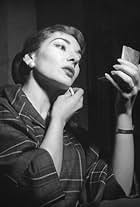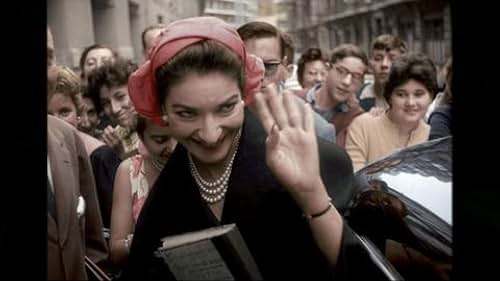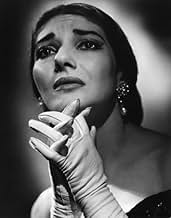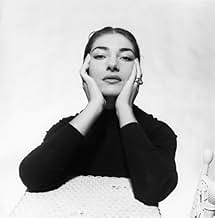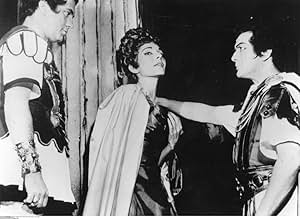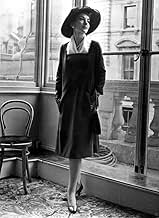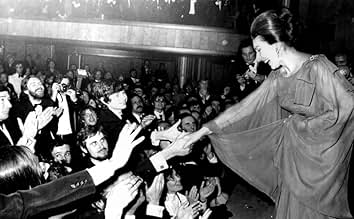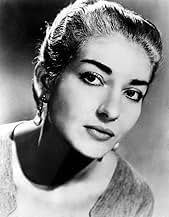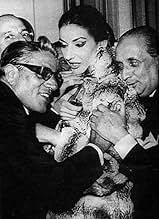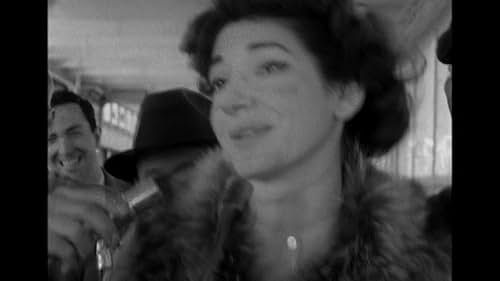Maria Callas(1923-1977)
- Actress
- Music Department
- Soundtrack
This volatile opera diva was born Sophie Cecilia Kalos in New York City to Greek émigrés on December 2,
1923. Her father set up a pharmacy and changed the family name from
Kalogeropoulos to Callas. As a child Maria studied the piano. When her
parents separated (she was 14 at the time), her mother returned to
Athens with Maria and her sister.
The budding singer was quickly accepted into the National Conservatoire where she was taught singing lessons by Maria Trivella. She performed her first recital within the year and in 1939 won a prize for her stage debut in the Conservatoire's production of "Cavalleria Rusticana." In 1941, the soprano dramatico d'agilita made her professional debut in "Boccaccio" with the Lyric Theatre Company. While there she made a semi-name for herself with performances of "Tosca" and "Fidelio."
Impending war led her back to the United States in 1944 where she reclaimed the name of Maria Callas. She was offered a contract from the Met which she turned down because among the three roles she was offered to sing there was Butterfly and she believed that she was too obese to sing the fragile 14 year-old Butterfly, her friends considered her to be crazy turning down the Met while she was so unknown.
Maria performed elsewhere (Chicago, etc.) before returning to Europe in the post-war years where she met Giovanni Battista Meneghini, a wealthy industrialist and avid opera fan. They married in 1949 and he immediately took control of her career. She reached her zenith at La Scala (1951-1958), also recording during that time. In 1956, she finally made her debut at the Met as "Norma" with performances of "Tosca" and "Lucia" following.
Within a couple of years her temperamental outbursts and excessive demands began to rise full force, resulting in a number of dismissals and walkouts. After meeting Greek shipping magnate Aristotle Onassis through her husband, a torrid affair erupted and her marriage ended. Maria gave up the stage in the early 1960s for the jet-set life with Onassis, but continued with occasional concerts. Despite experiencing vocal problems, she made one unforgettable comeback on stage in 1964-1965 when she toured with her personal favorites ("Norma" in Paris and "Tosca" at the Met). Weak and tired, her final curtain on stage rang down in July of 1965 in Covent Garden.
With her career over, she renounced her American citizenship and expected to marry Onassis. But their relationship was a stormy one and it eventually tapered off with Onassis instead marrying Jacqueline Kennedy in 1968. Maria was completely devastated and those around her say she never recovered. The following year she filmed an unsuccessful production of Medea (1969) and eventually set up master classes at Juilliard. In one last comeback, she attempted a European tour of recitals but her voice completely failed her. Her last public performance was on November 11, 1975.
Riddled by sadness and despair, and by now firmly addicted to sleeping pills, Maria turned reclusive in her last year and died of a heart attack in 1977 at age 53. Despite a career that flourished less than two decades, Callas must be respected as one of the more important and recognizable opera legends. She was certainly one of the most emotive and visually dramatic. What also carries her today is, of course, her grandly turbulent and tragic image -- an Édith Piaf of opera.
The budding singer was quickly accepted into the National Conservatoire where she was taught singing lessons by Maria Trivella. She performed her first recital within the year and in 1939 won a prize for her stage debut in the Conservatoire's production of "Cavalleria Rusticana." In 1941, the soprano dramatico d'agilita made her professional debut in "Boccaccio" with the Lyric Theatre Company. While there she made a semi-name for herself with performances of "Tosca" and "Fidelio."
Impending war led her back to the United States in 1944 where she reclaimed the name of Maria Callas. She was offered a contract from the Met which she turned down because among the three roles she was offered to sing there was Butterfly and she believed that she was too obese to sing the fragile 14 year-old Butterfly, her friends considered her to be crazy turning down the Met while she was so unknown.
Maria performed elsewhere (Chicago, etc.) before returning to Europe in the post-war years where she met Giovanni Battista Meneghini, a wealthy industrialist and avid opera fan. They married in 1949 and he immediately took control of her career. She reached her zenith at La Scala (1951-1958), also recording during that time. In 1956, she finally made her debut at the Met as "Norma" with performances of "Tosca" and "Lucia" following.
Within a couple of years her temperamental outbursts and excessive demands began to rise full force, resulting in a number of dismissals and walkouts. After meeting Greek shipping magnate Aristotle Onassis through her husband, a torrid affair erupted and her marriage ended. Maria gave up the stage in the early 1960s for the jet-set life with Onassis, but continued with occasional concerts. Despite experiencing vocal problems, she made one unforgettable comeback on stage in 1964-1965 when she toured with her personal favorites ("Norma" in Paris and "Tosca" at the Met). Weak and tired, her final curtain on stage rang down in July of 1965 in Covent Garden.
With her career over, she renounced her American citizenship and expected to marry Onassis. But their relationship was a stormy one and it eventually tapered off with Onassis instead marrying Jacqueline Kennedy in 1968. Maria was completely devastated and those around her say she never recovered. The following year she filmed an unsuccessful production of Medea (1969) and eventually set up master classes at Juilliard. In one last comeback, she attempted a European tour of recitals but her voice completely failed her. Her last public performance was on November 11, 1975.
Riddled by sadness and despair, and by now firmly addicted to sleeping pills, Maria turned reclusive in her last year and died of a heart attack in 1977 at age 53. Despite a career that flourished less than two decades, Callas must be respected as one of the more important and recognizable opera legends. She was certainly one of the most emotive and visually dramatic. What also carries her today is, of course, her grandly turbulent and tragic image -- an Édith Piaf of opera.
